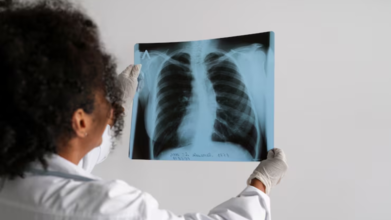- Health Conditions A-Z
- Health & Wellness
- Nutrition
- Fitness
- Health News
- Ayurveda
- Videos
- Medicine A-Z
- Parenting
- Web Stories
After Pig Kidney Transplants, Scientists May Have Found A Way To Transplant Pig Livers

Credits: Canva
Organ transplants involve replacing a failing organ with a healthy one from a donor. However there is always a shortage of human organ donors, and so scientists have been exploring xenotransplantation—using organs from animals, particularly pigs, for human transplantation.
Recently, Chinese researchers have reported significant progress in the field of xenotransplantation. A patient in China had successfully got her gene-edited pig kidney. This has made her the third person worldwide to live with such a transplant. Dr Lin Wang, a researcher at Xijing Hospital of the Fourth Military MEdical University in Xi'an, stated that nearly three weeks after surgery, the patient is now in good health. The pig kidney too is functioning well. As per the Chinese media, the recepienet was a 69-year-ols woman who had been living with kidney failure for the last 8 years.
What Are The Challenges Of Such Transplants?
The idea of using pig organs for human transplants is not new, however, it is in the recent times when attempts have been made in the US and in China. There were two initial attempts in the US that involved transplanting pig hearts and kidneys, however, the patients did not survive long. Though, two additional pig kidney transplants performed in the US- one in Alabama in November and another in New Hampshire in January- have been successful so far.
Despite these advancements, xenotransplantation still faces hurdles. The main challenge that remains for scientists is to overcome the risk organ rejection, immune system responses, and ensuring long-term functionality. Nonetheless, a US clinical trial on pig organ transplants is also set to begin soon, which will mark another step toward making these procedures more viable.
Is There A Potential For Pig Liver Transplants?
Researchers have now started looking beyond hearts and kidneys. There could be a possibility of transplanting pig livers. In the journal Nature, Dr Wang's team reported that they implanted a pig liver into a brain-dead patient, where it had survived for 10 days without early signs of rejection. The liver was also able to produce bile and albumin, which are essential functions of the organ. However, these productions were made at lower levels than a human liver.
The liver transplant is particularly more challenging because it has vital roles like filtering toxins, breaking down nutrients, fighting infections, storing iron, and regulating blood clotting. While the recent experiment did show limited functionality, Wang believes that there could be more to it. It could serve as a temporary support for patients with liver failure, which could be similar to dialysis for kidney patients.
Has There Been Attempt To Transplant Pig Liver Before?
Yes, this is not the first time scientists have experimented with pig liver transplants. Last year, researchers at the University of Pennsylvania in the U.S. attempted an external attachment of a pig liver to a brain-dead patient to filter blood. A Chinese hospital also reportedly performed a pig liver transplant on a living patient who had part of his cancerous liver removed, though details of the outcome remain unclear.
In another experiment, Wang’s team implanted a pig liver alongside a human liver in a brain-dead patient, rather than removing the human liver entirely. Experts believe this approach complicates the results, as it does not fully replicate a liver transplant scenario.
PCOS Awareness Month: 5 Lifestyle Tips To Manage PCOS According To Gynecologist

Credits: Canva
September is the month for PCOS awareness, which stands for Polycystic Ovary Syndrome. This is a condition that impacts a woman's hormonal levels, disturbs their menstrual cycle and can make everyday life challenging. As per the World Health Organization (WHO), PCOS affects an estimated of 6-13% of reproductive-aged women. Up to 70% of affected women remain undiagnosed worldwide. The condition is also associated with variety of long-term health problems that affect physical and emotional well-being.
1 in 5 Young Indian Women Has PCOS
As per a 2019 study published in the Indian Journal of Medical Research, 1 in 5 young Indian women suffer form PCOS. In some areas, suggests the study, the prevalence is as high as 29% to 35% women with PCOS, which has also contributed to widespread infertility issues. These percentages are far higher than the global prevalence that is noted by the WHO for PCOS, which is an average of 6-13%.
However, the symptoms could be managed through lifestyle changes.
5 Tips To Manage PCOS, According To Gynecologist
Dr Madhulika Singh, Senior Consultant Obstetrician & Gynaecologist at Ankura Hospital for Women and Child, Pune, as reported by Moneycontrol suggests these 5 tips, which can help one manage PCOS:
Diet Choices
Maintaining a healthy diet is a vital part of managing PCOS. Processed foods, refined sugar, and oily snacks often make symptoms worse. A more balanced approach focuses on whole grains, fresh vegetables, fruits, and healthy fats. Food, in this sense, works not just as fuel but also as medicine. For a tailored plan, consulting a nutritionist can be very useful.
Get Your Body Moving
Regular physical activity helps reduce insulin resistance, supports weight management, and improves overall mood. This doesn’t mean hours of intense exercise—activities like brisk walking, yoga, or light strength training for at least 30 minutes a day can be highly effective. Stress management also plays a big role, since chronic stress disrupts hormones. Simple routines such as meditation, deep breathing, or gentle stretching can restore balance and help control flare-ups.
Prioritize Your Sleep
Sleep is more than rest—it’s the body’s way of repairing itself. Poor sleep disrupts hormones and increases cortisol levels, which can worsen PCOS symptoms. Consistently aiming for 7 to 8 hours of quality, uninterrupted sleep can make a significant difference in overall health.
Sip, Soothe, and Support
Certain herbal teas, including spearmint, cinnamon, and flaxseed infusions, may help ease inflammation and support hormonal health. While these natural remedies can provide gentle support, they should complement—not replace—professional medical guidance.
Managing PCOS
PCOS is not a life sentence. With early action, consistent habits, and the right support, it can be managed effectively. The key lies in listening to the body, maintaining a balanced lifestyle, and seeking medical advice whenever something feels off.
Common Symptoms Of PCOS:
- Irregular period
- Weight gain around the sides and tummy
- Facial hair
- Stubborn acne
PCOS can also lead to type 2 diabetes, hypertension, heart issues and anxiety and depression, if not managed.
World Lung Day: Why Lung Cancer Remains The Top Risk For Death In Women, Even Those Who Do Not Smoke

(Credit-Freepik)
Lung cancer, as the World Health Organization (WHO) reports, is the leading cause of cancer-related deaths in most men and women, causing the death of an estimated 635,547 people in the US in 2022. However, a surprising statistic arose when the number of deaths caused by lung cancer in men dropped however, in women it has increased. The reason, suggest some researchers, could be because of a unique immune system in women that makes them more vulnerable to lung cancer. Find more information below:
For a long time, breast cancer has been a well-known health concern for women. However, over the past two decades, lung cancer rates in women have risen. According to the Lung Cancer Research Foundation, over 600,000 women die of lung cancer each year and one in 17 women will develop lung cancer in their lifetime.
Also Read: 3 Tests You Should Get Before 30s To Protect Your Heart, According To Cardiologist
This shift highlights a changing dynamic in who is affected by this disease, and it's a trend that's especially noticeable as smoking rates decline.
A surprising factor that has also been noted is that 20% of lung cancer diagnoses occur in non-smokers. What has caused these statistics and why are non-smokers at risk?
Why Lung Cancer Is on the Rise in Women
According to the Brown Health University, several factors may explain why women are increasingly affected by lung cancer:
Increased Vulnerability
Studies suggest that female smokers may be more likely to develop lung cancer than male smokers, even with similar levels of cigarette exposure.
Higher Rates in Non-Smokers
A larger proportion of women diagnosed with lung cancer are people who have never smoked.
Slower Decline in Smoking
The drop in smoking rates has been more significant among men than women, which has led to a more dramatic decrease in male lung cancer cases.
These combined factors suggest that as society moves away from tobacco, the risk of lung cancer seems to be disproportionately affecting women.
Why are Non-Smokers At Risk for Lung Cancer?
Brown Health University also states that while smoking is the leading cause of lung cancer, about 15% of all cases are diagnosed in people who have never smoked. For women with lung cancer, this number is even higher at 24%.
The exact reasons for lung cancer in non-smokers aren't fully understood, but it's likely due to a combination of environmental and biological factors. The lungs are constantly exposed to our surroundings, and things like secondhand smoke, radon gas, air pollution, and even certain viruses can increase a person's risk.
Some researchers also speculate that a woman’s unique immune system, designed to tolerate a fetus during pregnancy, might make her more vulnerable to early lung cancers that an immune system might otherwise clear.
What Is The Best Way To Combat High Lung Cancer Numbers?
The best tool for lung cancer screening is a CT scan. However, it's not recommended for people with a very low risk of the disease, such as those who have never smoked. The potential for harm, like finding benign growths that lead to unnecessary tests and procedures, outweighs the benefits in these cases.
Lung cancer screening is typically recommended for active smokers or heavy former smokers between the ages of 55 and 80. If you fit this criteria, you should speak with your doctor to see if you qualify.
What Are The First Symptoms Of Lung Cancer?
Unfortunately, the early symptoms of lung cancer are often confused with common respiratory infection like a common cold. These can include a
Persistent new cough
Shortness of breath
Wheezing
Hoarseness
While it's hard to ask healthy people to be on the lookout for such common symptoms, it's important to seek medical attention if these symptoms are unusually severe, long-lasting, or unexplained.
Lung Cancer Risk For People Who Never Smoked
Brown Health states that there is good news for non-smokers diagnosed with lung cancer. Their tumors often have specific genetic mutations (like EGFR, ALK, or ROS1) that can be treated with highly effective targeted drugs, which are often more successful than traditional chemotherapy or immunotherapy. Doctors now routinely test all patients with advanced lung cancer for these mutations.
As society becomes smoke-free, the overall death rate from lung cancer will continue to fall. However, thousands of Americans will still develop the disease from past exposure or for reasons unrelated to smoking. We must continue to push for better treatments and increased compassion for all lung cancer patients, regardless of their smoking history.
Tylenol And Autism: Acetaminophen Use During Pregnancy Does Not Cause Autism, According To Yale Doctor

Credits: AP, Yale University
For decades, acetaminophen, commonly known as paracetamol and branded Tylenol in the US has been considered the safest over-the-counter pain reliever for pregnant women. From headaches to fever relief, it has been the go-to medication recommended by doctors worldwide. However, thanks to the recent press conference in White House, President Donald Trump has now linked its use during pregnancy with autism and autism spectrum disorder (ASD).
In 2025, U.S. Health and Human Services Secretary Robert F. Kennedy Jr. highlighted this concern, announcing a $50 million Autism Data Science Initiative in May and issuing a warning in September about the potential link between acetaminophen and autism.
Also Read: World Lung Day: Why Lung Cancer Remains The Top Risk For Death In Women, Even Those Who Do Not Smoke
Despite such concerns, researchers stress that there is still no proven causal relationship between acetaminophen and autism.
What the Research Shows So Far
Dr. Zeyan Liew, Associate Professor at the Yale School of Public Health, has spent years investigating the environmental and medical contributors to neurodevelopmental disorders. His team’s work examines not only medication safety but also maternal health factors that may affect child development.
“We do not know yet for sure whether acetaminophen causes autism,” Dr. Liew explained. “Multiple observational studies across different populations have shown associations between frequent and long-term use in pregnancy and some negative effects on a child’s neurodevelopment. However, not all studies are specific about autism.”
These studies are important, but they also have limitations. Observational studies can show correlations, but they cannot confirm direct causation. Other health conditions may explain the link. For instance, fever during pregnancy is itself known to increase the risk of neurodevelopmental delays. Genetics, maternal illnesses, or concurrent use of other medications could also play a role.
In other words, while researchers have observed patterns, they cannot yet conclude that acetaminophen use during pregnancy is the cause of autism.
Yale’s Current Investigations
Dr. Liew is currently leading two major projects to shed more light on the issue.
One is an international collaborative study that looks at acetaminophen use in pregnancy and its relationship to six domains of neurodevelopment, from early to late childhood. “The project will also evaluate related factors, including maternal medical conditions, other treatments taken with acetaminophen, and family history of mental or physical health problems,” Liew said.
Also Read: All About The AMT-130 Gene Therapy - Treatment For Huntington's Disease
The second project, based at Yale, focuses on maternal behaviors and decision-making when it comes to using over-the-counter medications. Researchers are studying perceived risks, barriers to clinical consultation, and how safety information shapes women’s choices during pregnancy.
These studies aim to provide a clearer picture of how acetaminophen is used, the contexts in which it is taken, and whether its risks differ depending on frequency, dosage, or co-existing health conditions.
Are There Safe Alternatives?
When it comes to pain relief during pregnancy, acetaminophen has long been seen as the only widely recommended option. Alternatives such as ibuprofen or aspirin are generally discouraged, especially after 20 weeks of pregnancy, because of potential risks to fetal health.
“Unfortunately, there is no equivalent alternative for acetaminophen at the moment,” Dr. Liew noted. That means medical guidelines will continue to emphasize its use, at least until stronger evidence suggests otherwise.
For now, health authorities including the U.S. Food and Drug Administration (FDA) and the Centers for Disease Control and Prevention (CDC) continue to recommend acetaminophen as the safest over-the-counter pain reliever for pregnant women, provided it is used in the lowest effective dose for the shortest necessary duration.
Balancing Benefits and Risks
One of the biggest challenges is communicating medication safety without creating unnecessary alarm.
“These are nuances in medication safety communication,” Dr. Liew said. “We do not want people to fear using a treatment, but we also need to be mindful about limiting potential harm and risks.”
Pregnant women may worry about prolonged or frequent acetaminophen use. However, untreated fever or significant pain can also be harmful to both mother and child. Conditions such as high fever have well-documented risks for pregnancy outcomes and fetal development.
The balance, therefore, lies in careful, guided use: only when necessary, at the lowest dose, and in consultation with a healthcare provider.
Autism: A Complex Puzzle
Even as researchers probe possible links with medications, it’s important to remember that autism is not caused by a single factor.
“Autism is a highly complex disorder,” Dr. Liew explained. “As of now, researchers have not been able to pinpoint a single causal genetic or environmental factor. Hence, it is premature to declare we know for sure what is causing autism.”
Experts emphasize that continuing research into both genetic influences and environmental exposures remains crucial. The reality is that autism likely arises from a combination of multiple factors, some inherited, some related to prenatal conditions, and possibly others not yet understood.
For now, acetaminophen remains the standard and safest option for pain relief during pregnancy, but with an important caveat: moderation and medical guidance are key.
While some studies suggest associations between prolonged use and developmental outcomes, researchers like Dr. Liew caution against drawing premature conclusions. Until more definitive answers emerge, the best advice is simple: pregnant women should consult their doctors, use the lowest effective dose, and avoid unnecessary prolonged use.
The conversation about acetaminophen and autism is far from over, but ongoing global studies may soon bring more clarity to this pressing public health question.
© 2024 Bennett, Coleman & Company Limited

